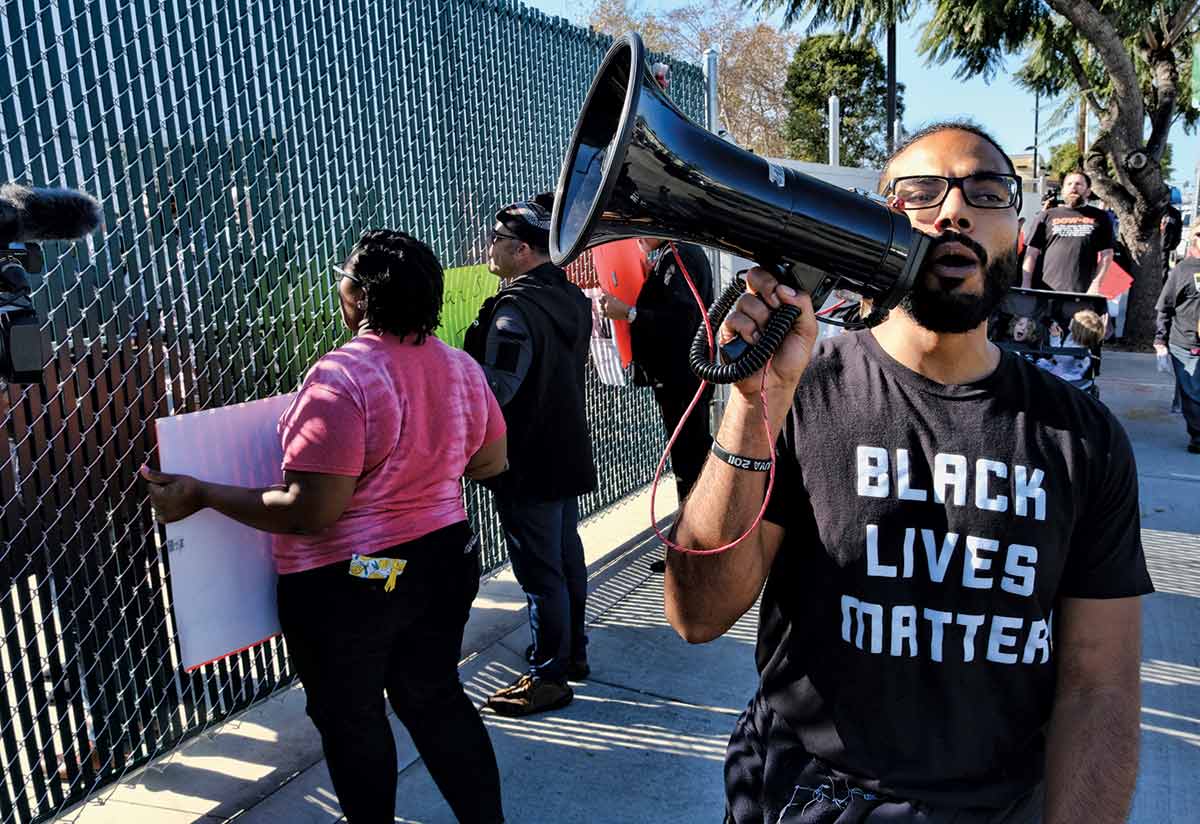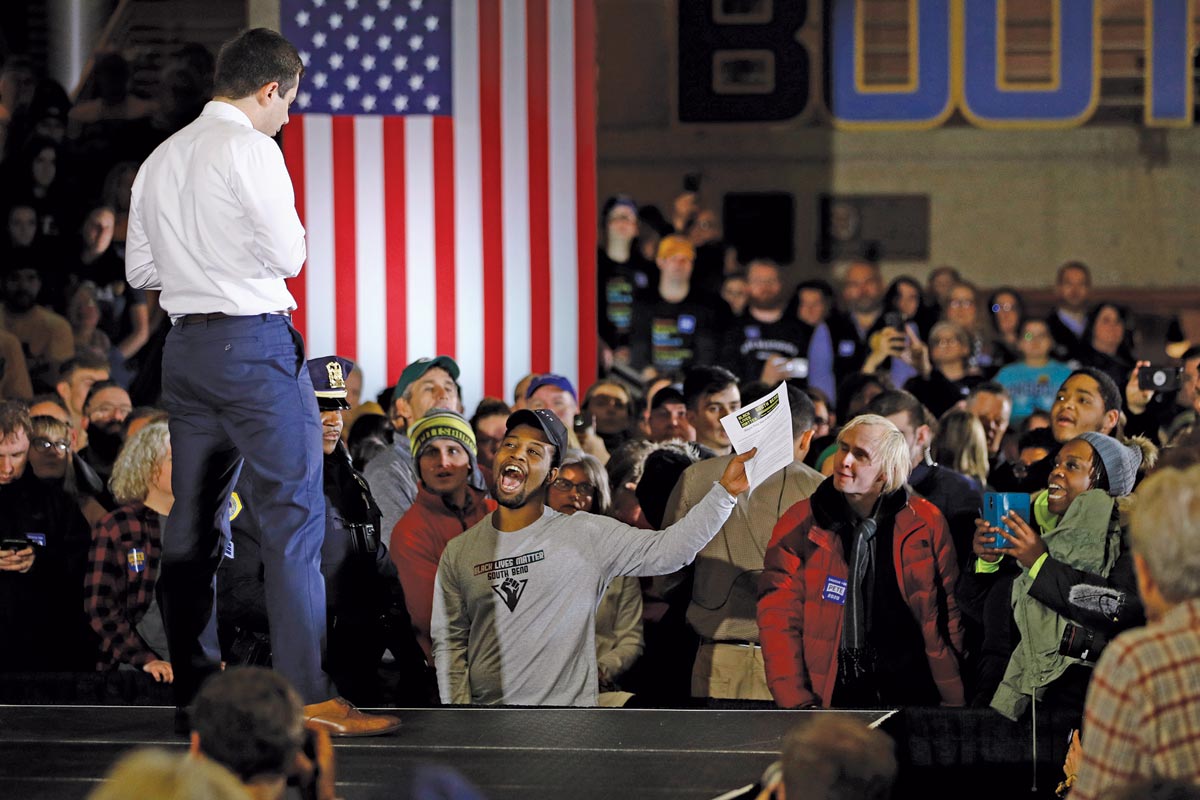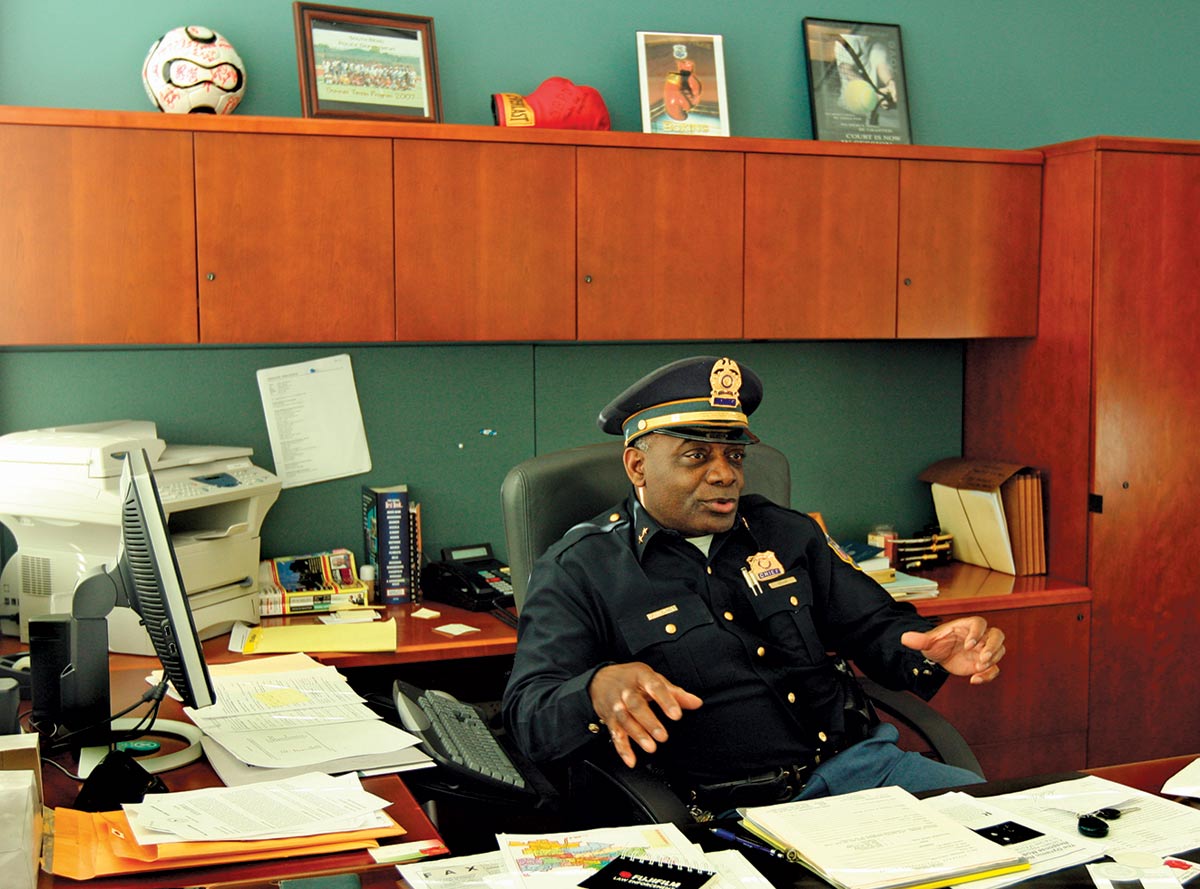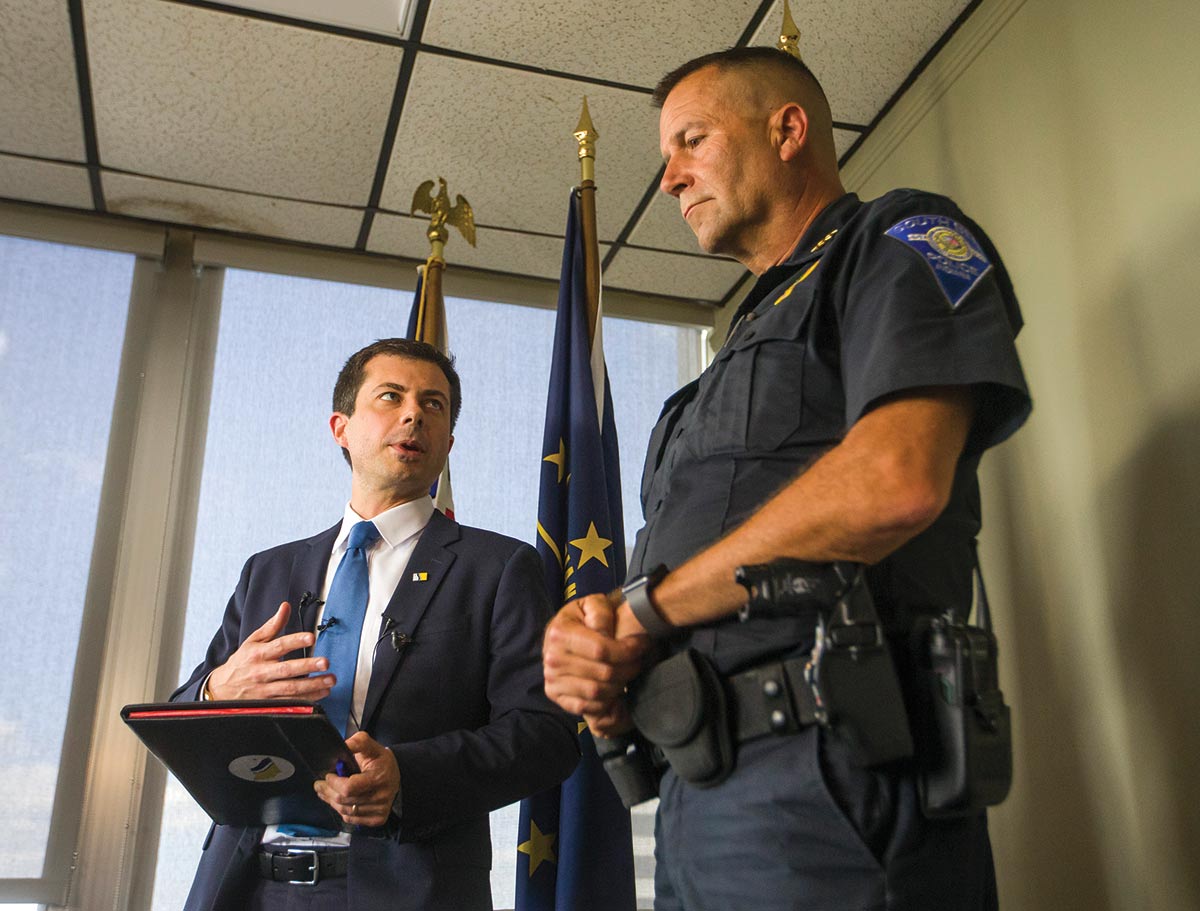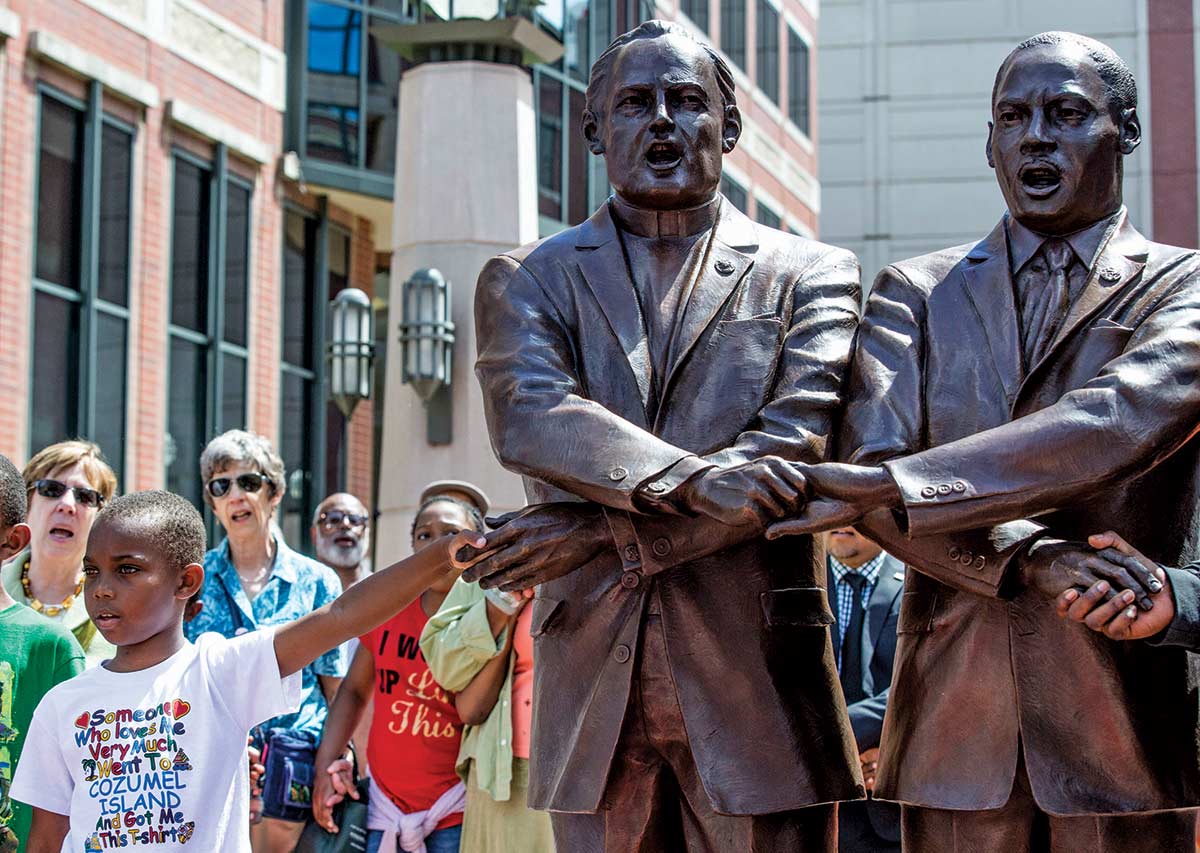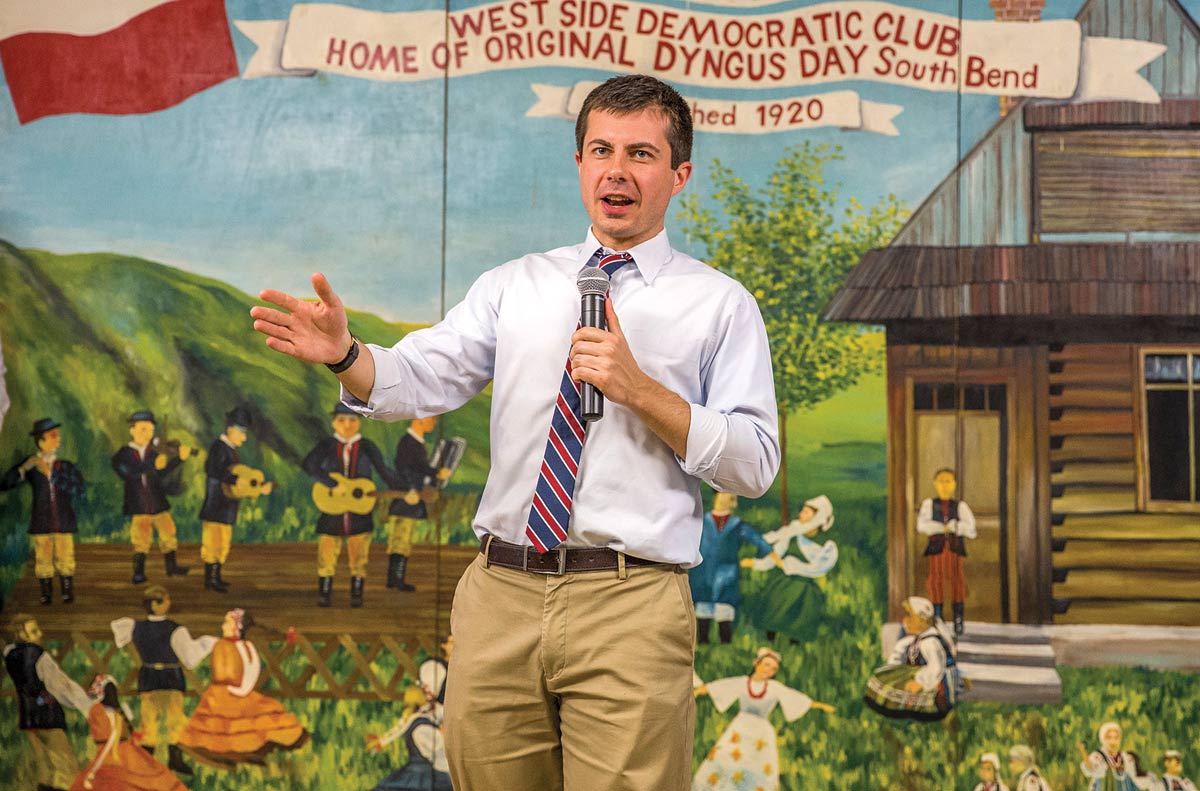South Bend, Ind.—I was born in this state and have a horror of its small cities. Indianapolis—my hometown, where my family is buried and where some of my best friends still live—was bad enough. I have not been back in a while. But I spent the icy Martin Luther King Jr. holiday weekend in South Bend, talking to black people about former mayor Pete Buttigieg and his presidential campaign’s difficulties with black voters, and his efforts to rectify the situation.
We come to where the East Race is reunited with the main course of the St. Joseph River. Here, the river is a rebellious churn of swirls and eddies, in a hurry to get somewhere. Trotting up a flight of concrete stairs, we pick up the East Bank Trail, which incorporates a former railway and will take us all the way up to the edge of the Notre Dame campus. The asphalt is smooth and wide, and the daylight is now peeking through between leaves under a canopy of trees that arches over us, as if the city were nowhere near. From my office on the fourteenth floor, most of the city looks like a forest, and in the summertime you would never guess that whole neighborhoods sit below the dark green carpet of treetops.
—Pete Buttigieg, Shortest Way Home: One Mayor’s
Challenge and a Model for America’s Future
Buttigieg’s blend of coming-of-age memoir and campaign manifesto reveals the obsessive, weird inner focus of the achiever who made up his mind to do great things at an early age and embarked on the error-free path. Born in 1982, a winner of the Profile in Courage high school essay contest, he met Senator Ted Kennedy and gave an address at the John F. Kennedy Library. An undergraduate at Harvard in 2004, when TheFacebook.com was launched, he studied, among other things, Arabic, having fallen for Tayeb Salih’s Season of Migration to the North. Buttigieg remembers the novel as being about an Arab graduate student’s sexual conquests among British women. Although he doesn’t say so in his memoir, we know that Buttigieg taught himself enough Norwegian to read Naïve. Super by Erlend Loe, a coming-of-age novel about a graduate school dropout. James Joyce learned Norwegian in order to write to Ibsen of his deep admiration, and Buttigieg’s title is a reflection of the soft spot he says he has for Ulysses, in which Leopold Bloom muses, “Think you’re escaping and run into yourself. Longest way round is the shortest way home.”
As a Rhodes scholar at Oxford, Buttigieg studied the analytical tradition in philosophy, lessons that would come back to him as an elected official obliged to adopt a utilitarian approach to policy: what brings the greatest good to the greatest number. He writes that as an associate in the Chicago office of McKinsey & Company, the “pinnacle of smart and useful analysis in the business world,” he became fascinated by “the nature of data.” But the rewards of the private sector could not answer the hunger of one called to service.
Popular
"swipe left below to view more authors"Swipe →
He was offered a place on Barack Obama’s Senate campaign but chose to work for John Kerry instead. Buttigieg watched from Arizona the convention speech that made the future president famous. In 2008, he took time off from his job to knock on doors in Iowa for Obama. And he was preparing to act on his belief that it was a failure of the postwar political elite to avoid military service. He survived the vetting that goes with getting a top security clearance and in 2009 signed on as an ensign in the United States Navy Reserve. Buttigieg tells us, perhaps too often, that in 2014 he had to take time off from the South Bend mayor’s office because he’d been called up for a seven-month deployment in Afghanistan.
A failed campaign for state treasurer and, after winning two terms as mayor, a strategically useful but unsuccessful bid to become chairman of the Democratic National Committee put some starch in his political collar. “Meet Pete,” his early signs read. He was one of those “impatient millennial products of South Bend,” dreaming of a city administration that kept its “public character” but ran on “business principles.” In 2011 he finally got his chance when the long-serving Democratic incumbent mayor of South Bend decided to step down. Buttigieg took office in 2012, sharing 9/11 with his generation as a formative experience and also a simmering resentment about corporate cynicism in the Great Recession of 2008.
Purposeful, humorless, corny, sincere—Buttigieg offers idealism, not ideology, and his claim to be an agent of good governance comes from having revived a city that Newsweek once dismissed as part of the dying industrial Midwest. “Good policy, like good literature, takes personal lived experience as its starting point.” Mayor Pete—everyone calls him that—is the butch voice of this sensitive flyover country. In his white shirtsleeves and dark ties, he looks like a Mormon missionary but projects a Macron-like, slightly-out-of-it technocrat’s air, and I don’t understand the criticism that says his meeting with Al Sharpton showed that he did not know how to eat chicken. In Shortest Way Home, Buttigieg remembers that he was in Brookville, Indiana, in the summer of 2010 when it broke the world record for the amount of chicken served at one sitting: 1,645 pounds.
“Why are they picking on him about the black vote?” Dr. Janet Evelyn demands. Caribbean born and a former president of Ivy Tech Community College in South Bend, Evelyn acts as a campaign surrogate, speaking on behalf of Buttigieg. “If Kamala Harris had the black vote, she’d still be in the race,” she tells me. “If Cory Booker had the black vote, he would still have been in. Why are you only focusing on Pete?”
We’re sitting in one of the carefully staged parlors of the inn where I was staying, once the kind of mansion that tormented Theodore Dreiser’s unhappy youths. It suddenly comes to me that I am nearly twice Mayor Pete’s age. Evelyn is on her way to South Carolina. I ask why his polling numbers in that state are so low among black voters. She says they didn’t know him. She also says that 40 percent of the Buttigieg volunteers are black or Latino. She mentioned Nina Smith, his black traveling press secretary. Mayors aren’t superheroes; they’re servants of the people, she says. And from her experience, Mayor Pete was a true servant of the people.
He’d been ambushed by protesters in Iowa. “If you are Black Lives Matter South Bend, why are you in Iowa?” Evelyn wanted to know. She added that some people were just showing off for CNN. Yet Buttigieg’s controversies with South Bend’s black citizens during his tenure as mayor provide a convincing explanation for why he has not been able to make himself more popular among black voters elsewhere in the country.
Shortest Way Home is not told chronologically. It moves by theme and anecdote, sometimes taking a while to circle back. Buttigieg seems uncomfortable in his account of what happened with black South Bend. He recalls deciding on a new approach to dealing with gang-related violence when the homicide rate started going up as he began his first term in 2012. “Controversially, I hired an outsider from Massachusetts to fill a vacancy in the position of police chief.” He doesn’t say at this point in the book that South Bend’s new white police chief from Boston replaced the city’s black police chief—a man he at first asked to resign and then demoted because of a wiretapping scandal that had put the newly reappointed chief under an FBI investigation.
Buttigieg inherited the FBI problem when he took office. Late in his book, he writes that the South Bend Police Department needed reform but he mistakenly put off tackling the issue. Darryl Boykins, the incumbent black police chief (whom Buttigieg does not refer to by name), was well liked and had built confidence between the black community and the police department. But the internal politics of the department “boiled over.” Boykins allegedly confronted white officers in the department with tape recordings of their conversations that would embarrass them if they became public. “Some phone lines in the department were connected to recording equipment used for interviews and investigations,” Buttigieg writes, “and the officers had been recorded on that equipment without their knowledge…. Enter the Federal Wiretap Act.” He notes that “making such recordings or disclosing their content can be a felony.” The recorded officers complained to federal authorities, and a few weeks into his new job as mayor, Buttigieg got a message, “thinly veiled but quite clear, from federal prosecutors: the people responsible for the covert recordings needed to go, or charges might be filed.”
He got bounced into it, he seems to be saying. He phoned Boykins and accepted the resignation that the police chief offered. “The reaction was instant and fierce.” Community outcry led the police chief to change his mind about quitting. But Buttigieg had lost confidence in Boykins’s leadership. The mayor demoted the chief to the rank of captain. “As of this writing, I have not heard the recordings, and I still don’t know if I, and the public, ever will.” Buttigieg says that the deeper meaning of the controversy had to do with trust between the black community and the police. It affected his relationship with the black community for years. He also had to explain why, in 2015, he used the loaded phrase “All lives matter” in a State of the City address when discussing racial bias. Last June, after a black man, Eric Logan, was killed by a white police officer, Buttigieg suspended his campaign in order to attend a town hall meeting. The killing remains the subject of a special prosecutor’s investigation, and the tapes scandal is still tied up in the courts.
It’s hard to present yourself to black voters as a fresh start in presidential politics when you’re associated with cases easily portrayed as unresolved because of police cover-ups.
Evelyn was quick to say that Eric Logan’s brother had marched with Mayor Pete. Maybe getting dogged by the old accusations was proof that Mayor Pete’s candidacy was real.
I spoke with Vernado Malone, a founder of the group Justice for South Bend, about Logan’s death. At 3:30 in the morning on Father’s Day in 2019, Logan, 54, left a group of his friends who had been planning a cookout for their children. Malone said that based on what the police chief, Scott Ruszkowski, told them, a police officer meant to tase Logan, who was said to have been breaking into a car, but pulled the wrong weapon. Delivering Logan to the ER himself instead of calling an ambulance, the officer may have exacerbated Logan’s wounds. The officer’s body camera wasn’t turned on. Malone contended that there was no blood at the crime scene, a parking lot. It had been cleaned up, he said, the evidence further tainted when an officer touched the car Logan had supposedly tried to break into. Malone also claimed the police woke the white owner of the vehicle in question and coached him on what to say.
Malone observed that the police said Logan was holding a knife. Malone was adamant that black men in his part of town did not carry knives: “We carry guns.” Therefore, he did not trust the police version of events.
The community, Malone said, asked that the officer involved be suspended without pay. Buttigieg refused. “He didn’t correct the problems, and they became a mistake.”
There may be a new mayor in South Bend now, but the Board of Public Safety, the civic authority charged with investigating the Logan shooting, was Buttigieg’s old board, its appointees too close to the city and the police to be anything but ineffective. The police couldn’t be trusted to investigate themselves. There was no civilian oversight committee because “they” didn’t want one. No charges have been filed against the officer. The Urban League doesn’t exist in South Bend anymore, and the city’s NAACP chapter is dormant.
I didn’t go on a tour of black South Bend offered by Theodore Randall, a professor of anthropology at Indiana University South Bend. However, he tried to give me a general picture of the grievances the black community might have against Pete Buttigieg, including that he’s seen as not being from South Bend but from Notre Dame, where his parents were high-powered faculty. They sent him to Catholic schools; he didn’t come up through the public school system. He was the mayor of downtown but not of the rest of the city, and blacks have won a meager percentage of government construction contracts. Some people minded 1,000 Houses in 1,000 Days, his program to replace benighted and derelict housing around the city. I couldn’t see for myself whether or not there were holes where structures had been demolished but nothing rebuilt in their place in black areas.
Randall urged on me recent articles in The Root and The Young Turks. In an article for TYT Investigates, Jonathan Larsen challenges Buttigieg’s assertion that he has no way of knowing what’s on the tapes from the Boykins scandal. Larsen claims that Buttigieg’s lawyers asked someone who knew what was on them. The conversations on the tape have been characterized by some sources as racist and include discussion about pressuring Buttigieg to get rid of the black police chief. The Root’s Michael Harriot examines the decline in the number of black police officers on the South Bend PD since the scandal broke, going in a short period from just under 12 percent, or 29 of 244 officers, to slightly over 6 percent, or 15 officers. Black people make up 26 percent of South Bend’s total population.
Randall also recommended I watch the Black Lives Matter South Bend media call concerning Buttigieg, during which Buttigieg’s old foe on the Common Council, Henry Davis Jr., insisted Mayor Pete isn’t naive, called him no better than Trump, and said black people are being harmed by his leadership. Davis didn’t believe Buttigieg had even 4 percent black support nationally, as the polls were saying. “You’re not trying to do it. You don’t want to do it, sir,” Davis fumed.
Black Lives Matter’s national spokesperson, Melina Abdullah, denounced Buttigieg for representing a liberal white supremacy that sustains the oppression of black people in spite of its rhetoric in favor of diversity. It was an insult, she said, for him to equate his being gay with the black experience. She said he’s not working for the black vote; he seems to think that strong showings in Iowa and New Hampshire will mean he won’t have to. She said Buttigieg is just blaming black people for not voting for him because he’s gay.
Randall introduced me to two leaders of Black Lives Matter South Bend, Jorden Giger and E-Lexus Thornton, thoughtful, intelligent, questing young math teachers.
Most teachers in the South Bend public school system are white. Giger and Thornton said they despair of getting through to their students, of being able to make up for what they lack at home, starting with parents who don’t know what to do, who themselves do not understand school. They spend a lot of time showing their classes that they are the bosses. They both have thick afros and look as with-it as any black youth.
And yet they shrugged off what having a same-race teacher in math may mean to their black middle school students. Thornton had been president of the Society of Physics Students. We assured them that some of their students will remember them for the rest of their lives. The young teachers, close friends, looked away, off toward a noisy table at the Linden Grill, a popular black restaurant where we sat for some time, making a mess.
Giger said that for him, Buttigieg was not the candidate to lead the nation in the 21st century because of his record in South Bend. He spent so little money on the black community while he was in office. He was too clubbable, made pals too easily with the old city network of white interests. “He doesn’t want to own his black problem,” Giger said. “He just wants to say he has black friends.” Both he and Thornton repeated to me the complaints against Buttigieg made in the press and on social media, one of them being that his campaign is a media creation.
Giger was the host of the Black Lives Matter South Bend media call. Mixed in with their criticisms of Buttigieg was the sense that he had used South Bend as a stepping-stone, that he had known all along he was just passing through. Janis Joplin once talked about the small-town blowback she got when she returned home a star. “This raggedy-ass city,” Giger said. “The Democratic Party is dying, and he’s a symptom of it.” Thornton is from elsewhere, but Giger came of age during Mayor Pete’s time in office. It seemed odd that Buttigieg, only 38 years old, should be the object of what seemed to me their generational scorn. For them, hip-hop is political. Cardi B would be as good a candidate as anyone.
“Every time we say, ‘This generation will be different.’ You have to be able to reach them, and we’re not. Because nothing ever happens for them,” Thornton said of his black students. It was hard to counter their “inability ever to believe they will ever get out of our situation.” What he said of his students, I wanted to say of him and Giger, their teachers. Giger said he’d held out against Afro-pessimism, but now…
There is an element of people going after Buttigieg because they can. Approval of him is power over him, and the longer it is withheld, the more important the fence-sitter appears. Black Lives Matter in Buttigieg’s case gives off an atmosphere not unlike some Me Too cases: You will never be forgiven. However, Abdullah seemed to hold out the possibility that if Buttigieg addressed the problem nationally and admitted his shortcomings, then black people—the “forgiving tribe,” Jill Nelson once called us—might get over the hurt he caused us in South Bend. But that is also trying to establish control over him.
A young white Buttigieg campaign worker, Sean Savett, and a young black colleague, Rodericka Applewhaite, expressed frustration with what they saw as a narrative that got going because people kept repeating it: Mayor Pete has a problem with the black vote. We were in the Chicory Café, a hipster locale that could have been cited in Buttigieg’s book as another sign of downtown revival. The two alert, cautious campaign workers were so prepared to defend Mayor Pete that my questions abandoned me. They did smile when I said I liked the campaign’s website and videos.
I’d wanted to talk to them about Buttigieg’s Douglass Plan, an extraordinary document about investing in black America that, regrettably, is suffering in the weather arising from its author’s perceived failure to side with black South Bend in any controversy with the white man’s police force. Most of the black people I spoke with gave the same answer when I asked if they’d read it: Not yet.
The Douglass Plan is written in the language of reparations. Indeed, Buttigieg calls for a committee to propose reparations policies to Congress. “America’s racist structures were built to justify and perpetuate slavery, and by achieving greater equity for Black Americans we lay the groundwork for achieving greater equity for other people of color as well.”
A technocrat’s version of call and response, the plan has several components in which problems are identified and solutions proposed. A national health equity strategy would “prioritize anti-racism.” The Douglass Plan speaks of health equity zones and accountable communities of health and the underrepresentation of black people in health care. In the area of education, the Douglass Plan proposes using Title I funding to increase teachers’ pay. It also pays particular attention to the mission of historically black colleges and universities.
The Douglass Plan seeks to end the War on Drugs, proposing to legalize marijuana, eliminate the prosecution of drug offenses, and improve police recruitment practices. It also calls for a reduction of sentences, the elimination of mandatory minimums, the formation of a clemency commission, and, importantly, the abolition of private prisons. It sees the end of so-called broken windows policing and the abolition of the death penalty by constitutional amendment. It envisions a 21st Century Voting Rights Act as well as something called the Walker-Lewis Initiative, named for 20th century black entrepreneurs, to address the inequalities of capital and asset accumulation in the black community. The Douglass Plan also proposes a 21st Century Community Homestead Act and a public trust for investment. This provision is crucial, given the astronomical cost projections of most direct reparation plans.
It is a document meant to be discussed, not summarized, drawing on sources ranging from the Institute for Criminal Policy Research and the Black Economic Alliance to Ebony magazine and the Brookings Institution—a sign, maybe, of Buttigieg’s style: the accumulation of data, continual evaluation with a goal in mind. Were Buttigieg’s name not attached to the Douglass Plan, we would be talking about its political descent from the black nationalist manifesto of the National Black Political Convention held in Gary, Indiana, in 1972 or its systemic reach, as called for in the manifesto of the Movement for Black Lives. The Douglass Plan says the District of Columbia should be a state.
I scraped the snow from the plaque at the base of the statue Buttigieg proudly refers to in his book, an almost life-size bronze of the Rev. Theodore Hesburgh, beloved president of Notre Dame, hand in hand with Dr. Martin Luther King Jr., commemorating the moment in 1964 when they demonstrated together in Chicago. Shortest Way Home is not Dreams From My Father. Its coziness of memory, its protectiveness toward South Bend, says everything about the racial divide and the different experiences of growing up white and black there. Buttigieg is tender in his recollection of those drunken, Polish celebrations of Dyngus Day. However, he resembles (or models himself on) Barack Obama—in his bipartisan inclinations, in the value he puts on being able to work across the aisle, in his public displays of an always equitable temper. And also in how he has been able to be openly gay in the most mainstream of political arenas.
Back during Obama’s first campaign, the word was that his advisers didn’t want him to call too much attention to his being black. After all, he needed only to show up to get the point across. Buttigieg, on the other hand, had to go publicly from situational passing for straight to being out and in office. We blush for him in the romantic paragraphs of his book when he remembers going down on one knee to propose to Chasten at the airport. He has been criticized for not being gay enough. Something similar was once said about Obama not being black enough. Buttigieg has a difficult task, saying he’s not the status quo while having to get across that he is, indeed, normal. Except he isn’t. He’s not really a privileged white male. Insides matter.
“‘But there is this one little thing,’” I remember Evelyn saying, quoting a black woman in South Carolina explaining her main reservation concerning Buttigieg. We get offended that the black community is said to be antigay, as if white communities weren’t also homophobic, but I kept hearing black people in South Bend say, “You know how they are down South.”
“Get over it,” Minister Deb Franklin said with a flash of her hands after the 8 o’clock service at Mount Carmel Missionary Baptist Church. Buttigieg is devout. The morning’s soloist sang, “Don’t give up on God / This ain’t the time to do it anyway, y’all,” and I thought, not for the first time that weekend, how like a bloc the black vote seems from a distance and how far across the political spectrum the black vote stretches when viewed up close.
Marla Godette, the dynamic organizer of the very emotional annual Martin Luther King Jr. America’s Sunday Supper, held in a large downtown hotel, said she did not like to be told that because she is black, she ought to vote in a certain way. “Quit worrying about who I am and come help me.”
It’s something of a manipulation to complain that the black vote is being taken for granted, I said, when everyone has been saying that no one is going to win without it, that the Democrats can’t choose someone black voters will stay home on, as many did with Hillary Clinton. But then black voters are so morally opposed to Agent Orange’s gangsterism, have so had enough of Republican Party collusion that the split between moderate and progressive factions in the Democratic Party was maybe not as meaningful to them as the question that cannot yet be answered: Who can win? I wondered if the longing for community radiated by every speaker at the supper wasn’t gratified by the black vote being a bloc vote once the primaries are over. Black people for the most part do not vote against their own interests—although not voting is a form of voting for the wrong side. Voter suppression is another matter.
At this point, Godette’s jovial husband confessed that he was a Republican. He thought Trump would win a second term. I was shocked. We’d been having such a good time.
The next morning, I tiptoed down the stairs of my landmark inn. On the way out of town, along the two-lane highway, we passed a white kid, hooded up and puffing through the snow along the blue side of the road. His job had to be up ahead, in one of the Pizza Huts or gas stations in the early-shift lights. In 2018 unemployment was just 3.2 percent in Indiana and 3.7 percent among blacks there. But much of it may be underemployment, without benefits, for instance. My Caribbean taxi driver of a certain age had scarcely mumbled a whole sentence to me over the weekend. Finally he relented and became the only black person I’d met in South Bend who supported Joe Biden. “Obama worked with him.” Most of my cousins are for either Elizabeth Warren or Amy Klobuchar. I decided I’d be the queer cousin for Pete Buttigieg.

